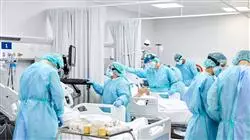University certificate
The world's largest faculty of nursing”
Introduction to the Program
Learn about the latest advances in Urgent Therapeutic Management of the Poisoned Patient to be able to perform a quality praxis"

Poisonings often become difficult situations to manage. Signs and symptoms can be varied and unspecific, so the evaluation of these patients requires a clinical history from a good source, an exhaustive interrogation where all the details are understood, as well as a complete physical examination and a health personnel trained to attend any type of eventuality.
Therefore, this program in the Urgent Therapeutic Management
of the Poisoned Patient for Nursing has been designed to provide professionals with sufficient knowledge in human toxicology to be able to successfully address the challenge of caring for patients with urgent toxicological problems.
The program is fundamentally aimed at the daily practice of the profession, referring to the study of those toxicants that come into contact with patients most frequently, minimizing as much as possible the theoretical foundations of the subject and focusing on the clinical care of the intoxicated patient. At the same time, we have given special importance to the practical approach required for therapeutic success.
The contents of this Postgraduate diploma are structured in large groups of topics with a pedagogical coherence. In this way, the student will be able to understand the proper way to perform an evaluation of a poisoned patient, explain the life support process and apply preventive techniques to perform a gastrointestinal absorption.
Furthermore, it is a 100% online Postgraduate Certificate that provides students with comfortable study and ease, wherever and whenever they want it. All you need is a device with internet access to take your career one step further. A modality in keeping with the current times with all the guarantees to position the nurse in a highly demanded sector.
The program in Urgent Therapeutic Management of the Poisoned Patient for Nursing will help you learn the process of applying life support in the acute intoxicated patient"
This Postgraduate diploma in Urgent Therapeutic Management of the Poisoned Patient for Nursing contains the most complete and up-to-date scientific program on the market. The most important features of the specialization are:
- The development of clinical cases presented by toxicology experts
- The graphic, schematic, and practical contents with which they are created provide scientific and practical information on the disciplines that are essential for professional practice
- The practical exercises where the self-evaluation process can be carried out to improve learning
- Clinical and diagnostic imaging and testing iconography
- An algorithm-based interactive learning system for decision-making in the clinical situations presented throughout the course
- Its special emphasis on toxicology research methodologies
- Theoretical lessons, questions to the expert, debate forums on controversial topics, and individual reflection assignments
- Content that is accessible from any fixed or portable device with an Internet connection
Improve your knowledge in Urgent Therapeutic Management of the Poisoned Patient with this program, where you will find the best didactic material with real clinical cases”
The program’s teaching staff includes professionals from the sector who contribute their work experience to this educational program, as well as renowned specialists from leading societies and prestigious universities.
Its multimedia content, developed with the latest educational technology, will allow the professional a situated and contextual learning, that is, a simulated environment that will provide an immersive training programmed to train in real situations.
The design of this program focuses on Problem-Based Learning, in which the professional will have to try to solve the different professional practice situations that will arise throughout the academic course. For this purpose, the student will be assisted by an innovative interactive video system created by renowned experts.
Increase your safety in decision making by knowing the decontamination procedures in dermatological poisoning"

Identify the clinical pictures that can occur in poisoning with neurological involvement"
Why study at TECH?
TECH is the world’s largest online university. With an impressive catalog of more than 14,000 university programs available in 11 languages, it is positioned as a leader in employability, with a 99% job placement rate. In addition, it relies on an enormous faculty of more than 6,000 professors of the highest international renown.

Study at the world's largest online university and guarantee your professional success. The future starts at TECH”
The world’s best online university according to FORBES
The prestigious Forbes magazine, specialized in business and finance, has highlighted TECH as “the world's best online university” This is what they have recently stated in an article in their digital edition in which they echo the success story of this institution, “thanks to the academic offer it provides, the selection of its teaching staff, and an innovative learning method aimed at educating the professionals of the future”
A revolutionary study method, a cutting-edge faculty and a practical focus: the key to TECH's success.
The most complete study plans on the university scene
TECH offers the most complete study plans on the university scene, with syllabuses that cover fundamental concepts and, at the same time, the main scientific advances in their specific scientific areas. In addition, these programs are continuously being updated to guarantee students the academic vanguard and the most in-demand professional skills. In this way, the university's qualifications provide its graduates with a significant advantage to propel their careers to success.
TECH offers the most comprehensive and intensive study plans on the current university scene.
A world-class teaching staff
TECH's teaching staff is made up of more than 6,000 professors with the highest international recognition. Professors, researchers and top executives of multinational companies, including Isaiah Covington, performance coach of the Boston Celtics; Magda Romanska, principal investigator at Harvard MetaLAB; Ignacio Wistumba, chairman of the department of translational molecular pathology at MD Anderson Cancer Center; and D.W. Pine, creative director of TIME magazine, among others.
Internationally renowned experts, specialized in different branches of Health, Technology, Communication and Business, form part of the TECH faculty.
A unique learning method
TECH is the first university to use Relearning in all its programs. It is the best online learning methodology, accredited with international teaching quality certifications, provided by prestigious educational agencies. In addition, this disruptive educational model is complemented with the “Case Method”, thereby setting up a unique online teaching strategy. Innovative teaching resources are also implemented, including detailed videos, infographics and interactive summaries.
TECH combines Relearning and the Case Method in all its university programs to guarantee excellent theoretical and practical learning, studying whenever and wherever you want.
The world's largest online university
TECH is the world’s largest online university. We are the largest educational institution, with the best and widest online educational catalog, one hundred percent online and covering the vast majority of areas of knowledge. We offer a large selection of our own degrees and accredited online undergraduate and postgraduate degrees. In total, more than 14,000 university degrees, in eleven different languages, make us the largest educational largest in the world.
TECH has the world's most extensive catalog of academic and official programs, available in more than 11 languages.
Google Premier Partner
The American technology giant has awarded TECH the Google Google Premier Partner badge. This award, which is only available to 3% of the world's companies, highlights the efficient, flexible and tailored experience that this university provides to students. The recognition as a Google Premier Partner not only accredits the maximum rigor, performance and investment in TECH's digital infrastructures, but also places this university as one of the world's leading technology companies.
Google has positioned TECH in the top 3% of the world's most important technology companies by awarding it its Google Premier Partner badge.
The official online university of the NBA
TECH is the official online university of the NBA. Thanks to our agreement with the biggest league in basketball, we offer our students exclusive university programs, as well as a wide variety of educational resources focused on the business of the league and other areas of the sports industry. Each program is made up of a uniquely designed syllabus and features exceptional guest hosts: professionals with a distinguished sports background who will offer their expertise on the most relevant topics.
TECH has been selected by the NBA, the world's top basketball league, as its official online university.
The top-rated university by its students
Students have positioned TECH as the world's top-rated university on the main review websites, with a highest rating of 4.9 out of 5, obtained from more than 1,000 reviews. These results consolidate TECH as the benchmark university institution at an international level, reflecting the excellence and positive impact of its educational model.” reflecting the excellence and positive impact of its educational model.”
TECH is the world’s top-rated university by its students.
Leaders in employability
TECH has managed to become the leading university in employability. 99% of its students obtain jobs in the academic field they have studied, within one year of completing any of the university's programs. A similar number achieve immediate career enhancement. All this thanks to a study methodology that bases its effectiveness on the acquisition of practical skills, which are absolutely necessary for professional development.
99% of TECH graduates find a job within a year of completing their studies.
Postgraduate Diploma in Emergency Therapeutic Management of the Intoxicated Patient for Nursing
Are you ready to become an expert in the care of intoxicated patients? With TECH Global University you can do it! Urgent therapeutic management of the intoxicated patient is an essential skill for nursing professionals working in emergency and urgent care settings. The Postgraduate Diploma in Emergency Therapeutic Management of the Intoxicated Patient for Nursing will provide you with the knowledge and skills necessary to identify, assess and treat intoxicated patients. You will study the different types of toxic substances, their routes of exposure and the effects they can have on the body. You will learn to recognize the signs and symptoms of poisoning and perform a rapid initial assessment to determine the severity of the clinical picture.
Become a specialist in the evaluation and management of poisoning
In this high-quality Postgraduate Diploma, you will learn how to take a complete clinical history and use specific tools to identify the toxic substance involved. In addition, you will acquire skills in administering antidotes and managing complications that may arise during treatment. In this program, you will be trained in the therapeutic techniques used in the management of intoxicated patients. You will learn how to administer specific medications, how to perform supportive therapies and how to adequately monitor vital signs. In addition, you will acquire knowledge about the nursing care needed to ensure the patient's stability and recovery. The Postgraduate Diploma in Emergency Therapeutic Management of the Intoxicated Patient for Nursing will provide you with the necessary training to become an expert in the care of intoxicated patients. Through this program, you will acquire the essential knowledge and skills to effectively identify, assess and treat patients who have suffered a poisoning. Prepare yourself to make a difference in emergency care and provide quality care to those who need it most.







